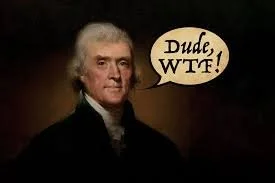THE DECLARATION -- FARMER STYLE
“I hold it that a little rebellion now and then is a good thing, and as necessary in the political world as storms in the physical.” — Thomas Jefferson
THE MIDWEST — JULY 4, 1873 — Fireworks, pancake breakfasts, and homespun hayrides greet another Fourth. But across America’s heartland, a little rebellion is brewing.
At Grange halls and picnics from Wisconsin to Kansas farmers celebrate this Fourth by reading from the Declaration of Independence. The Farmer’s Declaration of Independence. Like the original, it begins “When in the Course of Human Events. . . “ but soon follows its own course. Across amber waves of grain, the words ring out like Jefferson’s own.
— “systems of oppression and abuse. . .”
— “wealth wrung from the people. . .”
— “reign of licentious extravagance. . . “
A panic is gripping America. Banks are closing, businesses going bust. But farmers are bearing the biggest brunt. Ever since the Civil War, a spreading network of railroads has linked farms to markets, but the railroad, completely unregulated, has become “The Octopus.”
Many railroads are buying their own silos and grain elevators, forging monopolies that let them charge any rates they choose. And the men who control these monopolies are not from Main Street. They are from Wall Street.
“Wall Street owns the country,” says Kansas populist Mary Lease. “It is no longer a government of the people, by the people, and for the people, but a government of Wall Street, by Wall Street, and for Wall Street.”
The 1870s uprising of American farmers is often compared to a prairie fire. Like a fire, it spread quickly, engulfing whole communities. And like a fire, it left scars across the land, scars that changed American politics. The match that lit the fire was the Grange.
Begun just after the Civil War, the National Grange spread by word of mouth. From a single Grange Hall in Western New York, the movement flared westward. By 1872 there were 2,000 Granges across America. The next year, the year of the Farmer’s Declaration, another 8,000 opened.
The Grange was part social club, part co-op, and part union. Banding together against corporate power, farmers fought back, sharing the purchase of land, silos, seeds, milk, grain. . . The Grange’s founding document proclaimed: “We propose meeting together, talking together, working together, buying together, selling together, and in general acting together for our mutual protection and advancement.”
Grangers also pooled their political power. Neither Republican nor Democrat, they toyed with third parties. Populist Party. Greenback Party. Anti-Monopoly Party. By whatever name, farmers were soon, as one boasted, “a power which no party can afford to ignore.”
In the fall of 1873, after reading their declaration, farmers began running for office. Of 66 farmers on the Illinois ballot that November, 53 were elected to the state legislature. Soon a set of Granger Laws passed, the first laws in America to regulate prices and challenge monopolies. In 1877, in Munn v. Illinois, the U.S. Supreme Court upheld such regulation, swatting the free market’s “invisible hand” that had long been giving farmers the finger.
Corporations, the court wrote, were subject to the same laws that required each citizen “to so conduct himself, and so use his own property, as not unnecessarily to injure another. This is the very essence of government.”
Railroad tycoons were shocked. “When we commenced, eleven years ago,” said Robber Baron Mark Hopkins, “Congress and legislatures were gentle steeds. Bless me how they rear and tear now.” The Octopus fought back, packing the Supreme Court with judges that overturned most Granger Laws. But the seeds were sown.
By 1892, the farmers movement had grown into the People’s Party. Urged by Mary Lease to “raise less corn and more hell,” the party platform presaged progressivism years before it arrived. Union collective bargaining. A shorter work week. Federal regulation of railroads and other trusts. A graduated income tax. Direct election of senators. All these were eventually enacted, but it took decades for the rest of America to catch up with those radical farmers.
So happy Fourth, America. And if you have a weekend to celebrate, if you have a minimum wage, if Monopoly is just a game your kids play, you can thank America’s farmers. Long before anyone heard of “the 99 percent,” they understood the importance of equality.
“We desire a proper equality, equity, and fairness,” the Grange proclaimed. “Protection for the weak, restraint upon the strong; in short, justly distributed burdens and justly distributed power. These are American ideas; the very essence of American independence.”













